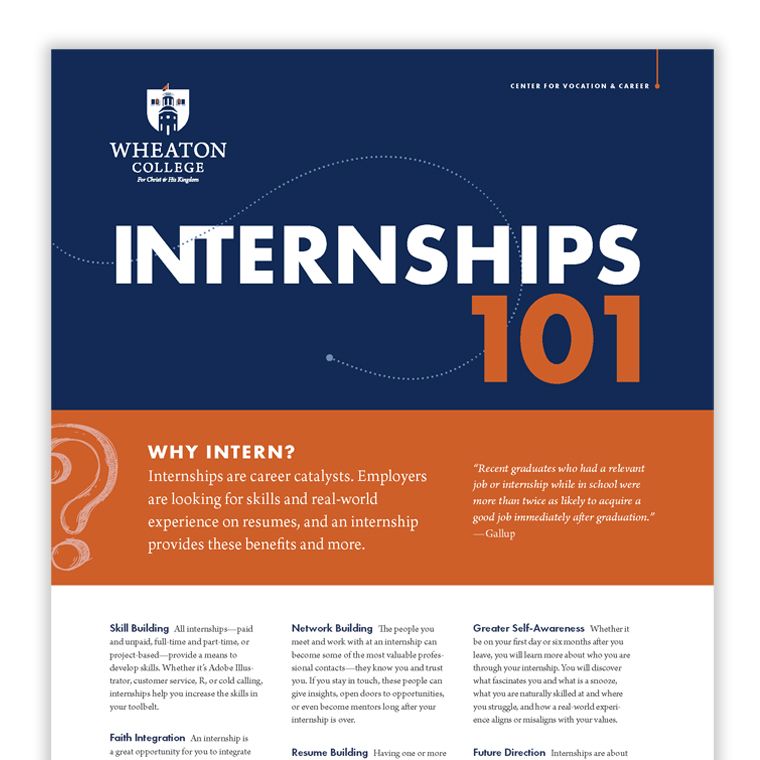Why is there so much hype surrounding internships? Internships are catalytic opportunities to develop skills, build a warm network, and 'test drive' an industry, organization, or job role. Employers look for experiences like internships to assess a candidate's demonstrated skills and work experience.
“Recent graduates who had a relevant job or internship while in school were more than twice as likely to acquire a good job immediately after graduation.” —Gallup
71% of the Wheaton class of 2022 knows why! They gained experience and explored their interests through internships around the world.
Research has shown that students who complete at least one internship are twice as likely to be engaged in their future jobs. In other words, internships lead to a better sense of where you best fit and why.
Funding for Internships
Wheaton College believes all students should have the opportunity to complete at least one internship while in college. Because summer is an ideal time to complete an internship, offices and centers across Wheaton’s campus offer awards and scholarships to make unpaid internships more attainable and sustainable for Wheaton students. Learn more about internship funding.
Benefits of an Internship
Skill Building
All internships—paid and unpaid, full-time and part-time, or project-based—provide a means to develop skills. Whether it’s Adobe Illustrator, customer service, or cold calling, internships help you increase the skills in your toolbelt.
Faith Integration
An internship is a great opportunity for you to integrate your faith and learning. How do you live out your theology in the workplace? God often challenges interns as they enter a new context. This might look like the way you treat the security guard, the attention to detail that you give, or the patience you show your fellow interns.
Network Building
The people you meet and work with at an internship can become some of the most valuable professional contacts—they know you and trust you. If you stay in touch, these people can give insights, open doors to opportunities, or even become mentors long after your internship is over.
Resume Building
Having one or more internships on your resume is a big plus, representing not just a highly relevant real-world credential, but also showing that you developed competencies employers are looking for. And, perhaps best of all, you’ve shown that you are an individual with the initiative and drive to land an internship.
Greater Self-Awareness
Whether it be on your first day or six months after you leave, you will learn more about who you are through your internship. You will discover what fascinates you and what is a snooze, what you are naturally skilled at and where you struggle, and how a real-world experience aligns or misaligns with your values.
Future Direction
Internships are about exploration. Some interns quickly begin picturing themselves working at the organization beyond their internship. Others can eliminate similar experiences from their list of future possibilities. Either way, these realizations are valuable because they clarify what you may want to do or not do.
How to Find (and land) an Internship
1) Set a Direction
What fields interest you most? What would be your dream job? What are you good at? Make a list of the types of experience you’d like to gain, the types of companies (or actual companies) you’d like to work for. Don’t be afraid to cast a wide net. Targeting one or more job types within a field is a great way to optimize your opportunities. Contact your Career Coach in the CVC to create a cohesive strategy (timeline, goals, and top resources).
2) Generate Options
Search the web for opportunities— Handshake, LinkUp, LinkedIn, industry job boards, and professional association websites are great places to look—focusing on your areas of interest. It's beneficial to identify and pursue multiple internship opportunities, even if they are very different. See our resource, Organizing Your Internship Search, to practice your project management skills.
3) Tap Your Network
Access the College’s network of alumni and contacts across the Chicago community and worldwide using LinkedIn. Connect with professionals in your areas of interest, family members, family friends, and others to seek advice and thoughts on potential internships. See Networking 101 for best practices.
4) Put Your Application Materials Together
This includes a tailored resume and cover letter for each application as well as updating your LinkedIn profile. The CVC has handouts to help you create each of these crucial elements. See our resources, Resume Format Matters, Customizing Your Resumes and Cover Letters and Cover Letter Outline for more tips and information!
5) Apply Strategically
Create a target list of “stretch” and “safety” internships: 30% of your applications should aim at the stretch list and 70% for the safety list. Internship programs are considering a lot of options, and so should you! Come by the CVC for help discovering internship opportunities, or look through the searchable database of internships previously done by Wheaton students.
6) Rock the Interview
Once you have interviews scheduled, do your homework to familiarize yourself with the organization and position. This will help you anticipate common questions and prepare thoughtful responses, develop a few questions of your own, and make a great impression. See our Interviewing 101 resource for more tips and information!
7) Follow Up
You’ll want to follow up with a thank-you note immediately after every interview. An email thank you is just fine and will arrive much faster than a handwritten note.

